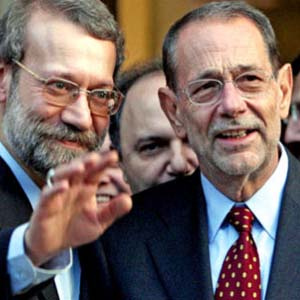A Parliamentary Attitude; Larijani’s Nuclear Agenda in His New Position

Nearly one week ago Ali Larijani was elected as the spokesman of the 8th Parliament. During this period, his remarks have signaled the determining role of the new parliament in Iran’s nuclear case.
Before entering the parliament as Secretary of Iran’s Supreme Council of National Security Larijani headed the Iranian delegation in nuclear negotiations and he holds a two year experience in this story.
Probably Larijani, who relinquished his responsibility to Sa’id Jaleeli and gained the vote of Qom’s [Iran’s biggest center for religious scholarship] citizens to enter the parliament, can now have a more decisive role in the nuclear course. With MPs decisive vote Larijani was elected as the spokesman of the 8th Parliament to start responsibility in an important position. The question here is will he open a new chapter in Iran’s nuclear story with parliament’s activities, or is he going to finalize the case with parliament’s decision?
The answer can be inferred from Larijani’s first speech in his new position. He addressed IAEA and warned of parliament’s entrance into the nuclear case if UN watchdog’s deceptions continue.
Larijani’s controversial speech was made right after the release of Elbaradei’s last report on Iran’s nuclear program. Referring to the report Larijani stated: “IAEA has pointed in this report that all the nuclear material for fuel enrichment factory and all the devices installed are under monitoring. Also, there have been no evidence related to reprocessing in nuclear sites and IAEA monitors the heavy water producing factory by use of satellite images. They have also explicitly said that they don’t possess any actual information about Iran’s construction of nuclear materials used for weapons. But unfortunately some sections of the report have been equivocal to make the report more media-favored.”
Larijani also advised those who negotiate with Iran to avoid passing Iran’s nuclear case back and forth between the IAEA and the Group 5+1. He showed Parliament’s position in the nuclear case stating: “the 8th Parliament will not allow such a deception and if such behaviors continue, by entering the [nuclear] case it will set new limits for cooperation with IAEA”.
8th Parliament’s position in the nuclear case
Parliament’s responsibilities and rights in the field of foreign diplomacy have been explained in the Iranian constitution. But direct experiences of Larijani Iran’s chief nuclear negotiator and the monitoring role of parliament as to government’s performance made 8th Parliament’s further role into this case predictable.
In fact, Larijani’s emphasis on parliament’s role in setting limits for Iran-IAEA cooperation and prioritizing monitoring role of parliament over the task of regulating relations with government, all show that Larijani possesses all the tools for effectively controlling the nuclear case. That’s why some experts believe in his new position Larijani can play a more powerful role in the nuclear case.
Apparently EU has understood this, and Solana’s warm felicitation show that the Europeans know a significant development in the nuclear course is on the way. Meanwhile, the European Union has stressed its interest to start talks with the 8th Parliament and increase the level of bilateral ties with Tehran. In a declaration, Slovenia, this year president of EU, has requested MPs to “call for and support peaceful and responsible government policies, which should aim at enhancing regional stability and restoring confidence between Iran and the international community."
It seems that in his new position Larijani is going to follow his previous strategy in the nuclear case, i.e. continuing negotiations with the Western side as the only way towards trust-building and explaining Iran’s interests. Larijani seeks more serious presence of the parliament in negotiations, nuclear decisions and regulation of Iran-IAEA ties.
Meanwhile, the IAEA Board of Governors’ meeting has been held from Monday 2nd of June to Friday 6th of June to discuss Elbaradei’s report on Iran’s nuclear case. Before that on February 25, Olli Heinonen, Elbaradei’s Deputy has explained the technical aspects of this report in closed-door briefing to diplomats and he has warned about Iran’s activities.
Now we have to wait and see whether the speculations over Larijani’s more power to resolve the nuclear issue in his new position are right or wrong

